
Insurance Underwritingand Economic Analysis: “Art and Science”

By Lewis Nibbelin, Guest Blogger for Triple-I
Home and auto insurance premium rates have been a topic of considerable public discussion as rising replacement costs and other factors – from climate-related losses to fraud and legal system abuse – have driven rates up and, in some states, crimped availability and affordability of coverage.
It’s important for policyholders and policymakers to understand the role of economic conditions and trends in setting rates. Jennifer Kyung, Property and Casualty Chief Underwriting Officer at USAA, opens a window into the complex world of underwriting and economics in a recent episode of Triple-I’s All Eyes on Economics podcast.
Kyung told podcast host and Triple-I Chief Economist and Data Scientist Dr. Michel Léonard that economic analysis “is critical to us in underwriting and as we manage our plan.” She described economics as “part of our muscle memory as underwriters” – adding that the economic uncertainty of recent years reinforces the need for underwriters to have “a very agile mindset.”
Underwriting and economics are “a little bit art and science,” representing a balancing act between sophisticated data analytics and creative problem-solving.
“When we think about sales and premiums for homeowners, we may look at things like mortgage rates or new home starts to indicate how the market is going,” Kyung said. “In auto, we might look at new vehicle sales or auto loan rates. These, in combination, help us look at macro-economic trends and the environment and how that might interplay with our volume projections. That helps us with financial planning, as well as operational planning.”
“It’s really critical to keep these on the forefront on an ongoing basis throughout the year,” she said, “so we can adjust as needed…. As our results come in, this gives context to the results.”
Through continual analyses of external market conditions and the internal quality and growth of your business, Kyung said, underwriters “can manage and mitigate some of the volatility and risk for our organizations.”
A tool she recommends for evaluating economic indicators is Triple-I’s replacement cost indices, which track the evolution of replacement costs throughout time across various lines of insurance and geographic regions. These indices enable insurers to synthesize raw economic data and insurance market trends, providing an auxiliary framework to bolster financial and operational planning.
Kyung said Triple-I offers additional insight into “local flavor,” or “understanding what the emerging issues are…related to the local environment,” through such tools as Issues Briefs and Insurance Economics Profilers. Recent supply-chain disruptions have accentuated the relationship between local and global economies, revealing the importance of employing local economic analytics to interpretations of broader insurance market patterns.
Such fusions can help facilitate efficient planning in the face of shifts in the insurance landscape.
The full interview is available now on Spotify, Audible, and Apple.




